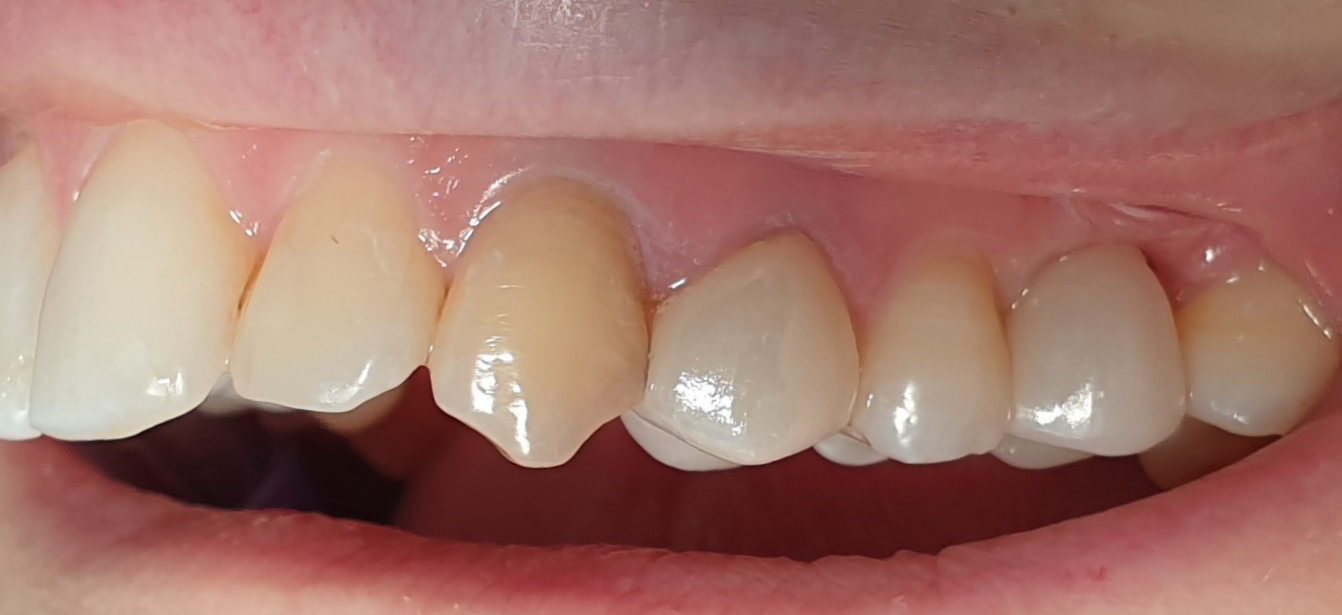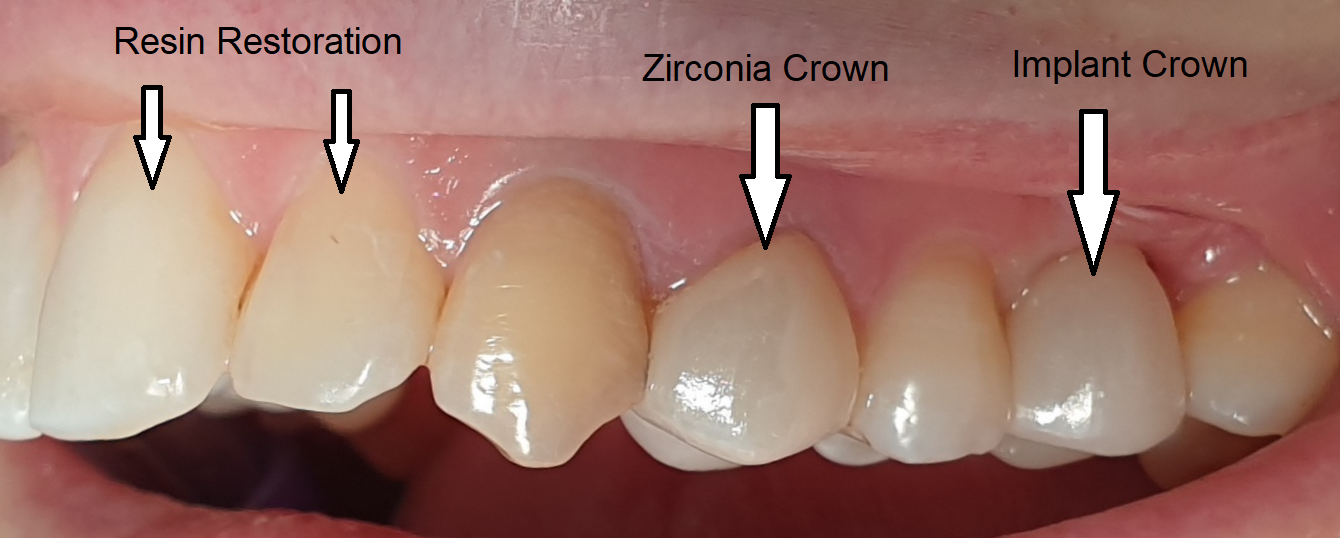Dental Implants
 There are intact teeth, a crown some tooth coloured resin restorations and 1 implant crown in this picture. Guess which one is the implant. (scroll to the bottom of the page for the answer)
There are intact teeth, a crown some tooth coloured resin restorations and 1 implant crown in this picture. Guess which one is the implant. (scroll to the bottom of the page for the answer)
The dental implant surgery is a short outpatient operation performed by a trained dental professional carried out under local anaesthesia.
Dental implants are designed for toothless areas, involving implanting artificial small post-like dental roots made
of titanium or titanium zirconium, surgically placed in the jaw bone to replace missing tooth roots.
Once integrated, dental implants act as a base, hidden from view in the jawbone, to anchor the final restoration. The visible portion of your artificial tooth – ranging from dental crowns, multi-tooth bridges, or full-arch dental prostheses.
The best situation for a dental implant is one where :
Treatment with dental Implants
The most common dental implant is a single tooth replacement with a single implant supported crown.
The dental implant is inserted under local anaesthesia.
Dental implant is left to heal for 3 - 12 weeks or longer.
Exactly when the implant can be placed after a tooth has been removed is depends on the situation. Typical situation is immediately after extraction or anytime till 12 weeks after extraction. The variables depending on the quality of bone, the size of the space left by the tooth after extraction and whether there is inflammation/infection in the site.
If bone quality is good, the space left by the tooth is not too big and there is no infection present, it is possible to place an implant immediately after the tooth is extracted. Otherwise a period of healing of about 12 weeks is usually required before the implant is placed.
Once the implant fixture has been placed it is usual to wait 3-6 months for it to osseointegrate with the bone without interference from chewing forces. The healing time depends on the kind of implant, your bone health and your general physical condition.
After this period, an impression is taken an the crown is made. This phase typically takes 1-2 weeks.
Implant treatment is therefore not a one visit affair.
There have been (and still are) some quarters that advocate that an implant, the crown etc can all be placed on the same visit. This treatment regimen is technically possible but carries with it a higher risk of failure which you should be aware of when deciding your treatment regimen.
How many dental implants can I have?
The number of dental implants that you need depends on your bone quality and condition. It may not necessarily correspond to the number of missing teeth. For bridge restoration, 2 implants may replace 4 or 4 implants for 14 teeth.
Dental implants are designed for toothless areas, involving implanting artificial small post-like dental roots made
of titanium or titanium zirconium, surgically placed in the jaw bone to replace missing tooth roots.
Once integrated, dental implants act as a base, hidden from view in the jawbone, to anchor the final restoration. The visible portion of your artificial tooth – ranging from dental crowns, multi-tooth bridges, or full-arch dental prostheses.
The best situation for a dental implant is one where :
- the implant supports a single tooth as part of a complete dental arch with well distributed forces
- oral hygiene and gum health is good
- there is no night grinding or other grinding tendency
- there is sufficient volume of native bone to enclose the implant fixture
- the bone is dense
Treatment with dental Implants
The most common dental implant is a single tooth replacement with a single implant supported crown.
The dental implant is inserted under local anaesthesia.
Dental implant is left to heal for 3 - 12 weeks or longer.
Exactly when the implant can be placed after a tooth has been removed is depends on the situation. Typical situation is immediately after extraction or anytime till 12 weeks after extraction. The variables depending on the quality of bone, the size of the space left by the tooth after extraction and whether there is inflammation/infection in the site.
If bone quality is good, the space left by the tooth is not too big and there is no infection present, it is possible to place an implant immediately after the tooth is extracted. Otherwise a period of healing of about 12 weeks is usually required before the implant is placed.
Once the implant fixture has been placed it is usual to wait 3-6 months for it to osseointegrate with the bone without interference from chewing forces. The healing time depends on the kind of implant, your bone health and your general physical condition.
After this period, an impression is taken an the crown is made. This phase typically takes 1-2 weeks.
Implant treatment is therefore not a one visit affair.
There have been (and still are) some quarters that advocate that an implant, the crown etc can all be placed on the same visit. This treatment regimen is technically possible but carries with it a higher risk of failure which you should be aware of when deciding your treatment regimen.
How many dental implants can I have?
The number of dental implants that you need depends on your bone quality and condition. It may not necessarily correspond to the number of missing teeth. For bridge restoration, 2 implants may replace 4 or 4 implants for 14 teeth.
Do dental implants last "forever" or our entire life?
Surgical titanium is an extremely stable material that is compatible with the human body. Implants are designed to last with professional treatment and proper after-care. It is possible for an implant to last you the rest of your life but there are factors that can affect this happy outcome.
Implant longevity and long-term success are closely related to the following factors
What can go wrong
Are implants the same/superior to natural teeth?
Implant is attached to the alveolar bone like a natural tooth and looks and feel like one too. With a bridge, your healthy adjacent teeth will be affected whereas for implant there is requirement to damage your healthy teeth.
From the preceeding section it should be clear that implants are very unlikely to be superior to natural teeth. The only ailment natural teeth suffer from that implants cannot is dental caries (tooth decay). Against this it is generally accepted that implants are usually more susceptible to gum disease.
Are implants maintenance-free?
Implant supported crowns need to be cleaned (by brushing and flossing) the same way as natural teeth. Regular dental check-up and scaling is also necessary. Other types of implant supported restorations / prostheses like dentures or bridges will usually require the same sort of maintenance as the regular kind of prostheses.
In addition there are parts of an implant that can wear out and need repair/replacement over the lifetime of the implant and the patient. One example is that connecting screw.
What can we do to facilitate a long service life and minimal problems?
Cautions after an implant surgery
Apply ice on the cheek where the surgery was performed. The surgery part may swell for 2 to 3 days.
Refrain from strenuous exercise or activities for about 1 week. This also include sauna, hot bath, carrying heavy groceries and household chores.
Avoid situations where there is possibility of trauma to the cheek and cause a dislodgement of implant, bleeding, and injury. About 3 to 6 months is needed for the implant to fully integrate to the bone. Trauma or biting hard food like nuts during this period may also increase chance of failure. Chew food on the opposite side of the surgical part and avoid hot food.
Refrain from drinking alcohol and smoking for 2 weeks.
In case of bone graft to the maxillary sinus, avoid blowing your nose, gargling or spitting.
Surgical titanium is an extremely stable material that is compatible with the human body. Implants are designed to last with professional treatment and proper after-care. It is possible for an implant to last you the rest of your life but there are factors that can affect this happy outcome.
Implant longevity and long-term success are closely related to the following factors
- Bone quality (both the initial situation and subsequent changes throughout life)
- Gum health
- Bite/Functional load
- Maintenance
What can go wrong
- the restoration can fracture/fail
- the connector between the implant and the restoration can fracture
- the implant fixture itself can fracture
- the bone can resorb due to excessive loading or gum disease (a condition called periimplantitis)
- Gum recession and food impaction
Are implants the same/superior to natural teeth?
Implant is attached to the alveolar bone like a natural tooth and looks and feel like one too. With a bridge, your healthy adjacent teeth will be affected whereas for implant there is requirement to damage your healthy teeth.
From the preceeding section it should be clear that implants are very unlikely to be superior to natural teeth. The only ailment natural teeth suffer from that implants cannot is dental caries (tooth decay). Against this it is generally accepted that implants are usually more susceptible to gum disease.
Are implants maintenance-free?
Implant supported crowns need to be cleaned (by brushing and flossing) the same way as natural teeth. Regular dental check-up and scaling is also necessary. Other types of implant supported restorations / prostheses like dentures or bridges will usually require the same sort of maintenance as the regular kind of prostheses.
In addition there are parts of an implant that can wear out and need repair/replacement over the lifetime of the implant and the patient. One example is that connecting screw.
What can we do to facilitate a long service life and minimal problems?
- Meticulous hygiene is the single most important factor in implant longevity
- Regular Monitoring by attending regular dental recall appointments (typically every 6 months) - this will enable early detection of some (unfortunately not all) problems so that countermeasures can be instituted
- Take steps to ensure we do not overload the implant. If you notice that you grind your teeth at night it is advisable to have a nightguard made
Cautions after an implant surgery
Apply ice on the cheek where the surgery was performed. The surgery part may swell for 2 to 3 days.
Refrain from strenuous exercise or activities for about 1 week. This also include sauna, hot bath, carrying heavy groceries and household chores.
Avoid situations where there is possibility of trauma to the cheek and cause a dislodgement of implant, bleeding, and injury. About 3 to 6 months is needed for the implant to fully integrate to the bone. Trauma or biting hard food like nuts during this period may also increase chance of failure. Chew food on the opposite side of the surgical part and avoid hot food.
Refrain from drinking alcohol and smoking for 2 weeks.
In case of bone graft to the maxillary sinus, avoid blowing your nose, gargling or spitting.

